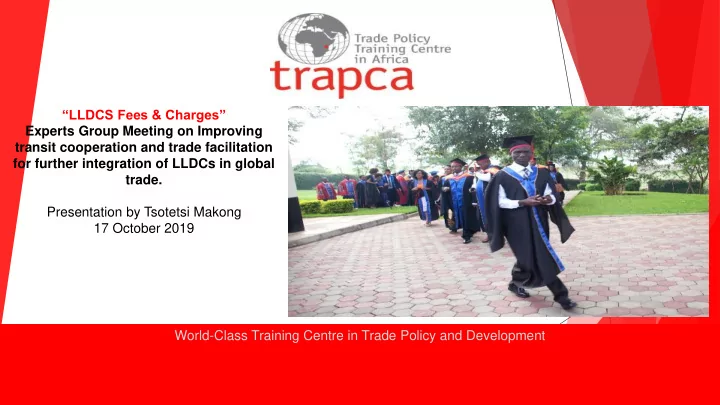

“LLDCS Fees & Charges” Experts Group Meeting on Improving transit cooperation and trade facilitation for further integration of LLDCs in global trade. Presentation by Tsotetsi Makong 17 October 2019 World-Class Training Centre in Trade Policy and Development
trapca’s Mandate ▪ Vision: A centre of excellence in Trade Policy Capacity Building for least developed countries and low income countries in sub-Saharan Africa (SSA). ▪ Mission : Empower clients through training and research and enhance their trade policy capacity to negotiate more favourable international trade arrangements.
trapca’s Mandate ▪ TFA Article 11 2. Traffic in transit shall not be conditioned upon collection of any fees or charges imposed in respect of transit, except the charges for transportation or those commensurate with administrative expenses entailed by transit or with the cost of services rendered. 3. Members shall not seek, take or maintain any voluntary restraints or any other similar measures on traffic in transit. This is without prejudice to existing and future national regulations, bilateral or multilateral arrangements related to regulating transport, consistent with WTO rules.
Measures on Fees and Charges TFA Article 6.1 General Disciplines on Fees and Charges TFA Art. 120 CAT. 6.1 Cat. 35.7 100 A % % of notifications 80 Cat. 28.5 60 B % 40 Cat. A Cat. 14.2 Cat. B C % 20 Cat. C Not yet 0 Not 21.4 Yet % Effective Implementation 35.7% Sub- Sahara LLDCs
Measures on Fees and Charges TFA Article 6.2 - Specific Disciplines on Fees and TFA Art. Charges CAT. 6.1 120 Cat. 50% 100 A % of notifications 80 Cat. 21.4 B % 60 40 Cat. 21.4 Cat. A C % Cat. B 20 Cat. C 0 Not 7.1% Not yet Yet Effective Implementation 50% Sub-Sahara LLDCs
Measures on Fees and Charges TFA Art. TFA Article 6.3 - Penalty Disciplines CAT. 6.1 120 Cat. 28.5 100 A % % of notifications 80 Cat. 42.8 60 B % 40 Cat. A Cat. 7.1% Cat. B 20 C Cat. C 0 Not yet Not 21.4 Yet % Effective Implementation Sub-Sahara LLDCs 28%
Trade Information Portals ▪ SADC yet to have one EAC has Trade Information Portal (TIP) giving ▪ access to step-by-step guides on licenses, pre-clearance permits and clearance formalities for the most traded goods within, to and from the East African Community (EAC). COMESA - UNCTAD to design and develop ▪ national and regional Trade Information Portals (TIPs) and the Customs Automation Regional Centre (CARC). ECOWAS has one ▪ Good number of National Trade Information ▪ Portals in place and coming up + ASYCUDA etc ▪ Agency Specific (Diversity and complexity) ▪ Trade info. goes beyond classical 4 walls of TF ▪ However what matters is: ▪ The content of trade information portals, Their accessibility ▪ ▪ Their user friendliness Their conformity to market structure ▪
Conceptualization of Fees and Charges Macrocosmic understanding of trade reforms ▪ Fees and Charges in their diversity are generally NOT collectivized in their publication ▪ ▪ trade information portals may be excellent platforms that provide user friendly information Fees and Charges have to be conceptualized in the context of regional integration ▪ ▪ Streamlining of implementation of measures is key as well as harmonization of fees Lesotho – Mauritius Textile Industry Case Whether a country is landlocked or not transit related challenges can be far reaching Similarly TF measures have to be so conceptualised in respect of their operational ▪ aspects Interoperability of TF measures has to be fully understood & ▪ ▪ Transnational nature of the measures
Recommendation Regional Approach ? ▪ Article 24.5 Members of a customs union or a regional economic arrangement may adopt regional approaches to assist in the implementation of their obligations under this Agreement including through the establishment and use of regional bodies. Assessment of interoperability of TF measures ▪ WTO plus measures and synchronization of implementation of measures? ▪ Domestication and Multi-sectoral reform agenda ▪
Recommend
More recommend